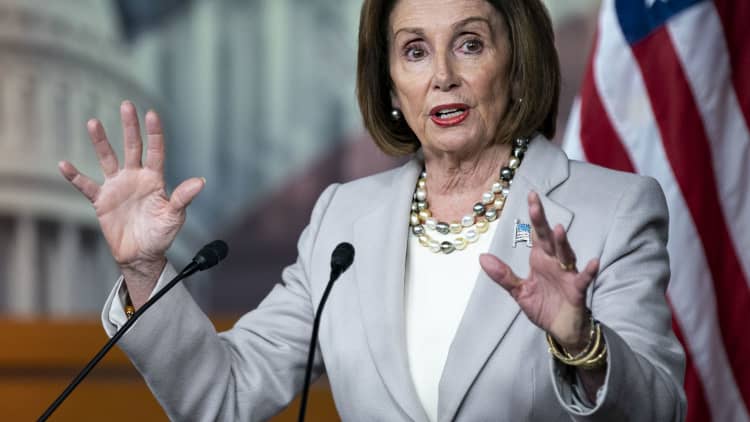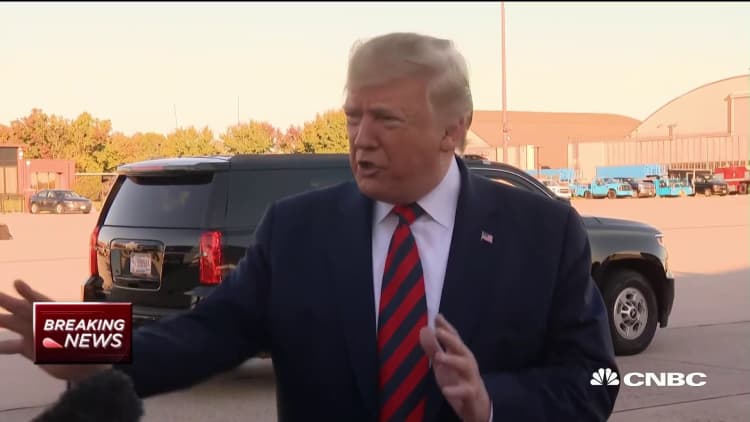Gordon Sondland, the U.S. ambassador to the European Union, revised his original testimony in the House impeachment probe into President Donald Trump to add that he conveyed to a Ukrainian counterpart that Trump would not release nearly $400 million in foreign aid until the country agreed to launch specific investigations sought by Trump.
"I said that resumption of the U.S. aid would likely not occur until Ukraine provided the public anticorruption statement that we had been discussing for many weeks," Sondland said in a document released Tuesday by the three House committees carrying out an impeachment probe, describing his conversation on Sept. 1 with a top Ukrainian official.
Sondland went on to say that the Ukrainian official had pressed him for details about exactly what Trump wanted in exchange for releasing the aid, which had been appropriated by Congress.

Sondland said he recalls telling the official that if Ukraine wanted the U.S. military aid, then the country's newly elected president, Volodymyr Zelensky, would need to deliver a public statement in person announcing the launch of investigations intended to benefit Trump politically.
The four pages of written revisions to his October testimony were submitted on Monday, just a day before the entire testimony was released by House impeachment investigators.
The new testimony from Sondland, who is still employed as Trump's ambassador to the EU, threatens to undermine claims by Trump and his political allies who have repeatedly denied that congressionally mandated foreign aid to Ukraine worth nearly $400 million was ever used as leverage by Trump to try and pressure the country into launching investigations.
White House press secretary Stephanie Grisham responded to the new testimony Tuesday afternoon, saying in a statement, "Both transcripts released today show there is even less evidence for this illegitimate impeachment sham than previously thought."
In explaining his change of heart, Sondland claimed that it was the testimony of other current and former administration officials who spoke to House investigators after he did, and who contradicted Sondland's original testimony, that "refreshed my recollection" and prompted Sondland to write an addendum to his original deposition.
In addition to conditioning military aid on the two investigations Trump sought, Sondland said it was clear that the Trump administration was also conditioning a White House visit for Zelensky on Ukraine doing what Trump and his personal lawyer Rudy Giuliani wanted.

"There were demands, weren't there, that an investigation take place of 2016 or Burisma? Ultimately those were demands, were they not?" one of the investigators asked Sondland, according to his October testimony, which was released Tuesday..
"Ultimately, yes," Sondland replied.
"And it's fair to say that you had to navigate those demands, you had to accommodate what the President and his lawyer wanted, if you were going to set up this meeting you thought very important?" a questioner asked.
"I think that's fair," said Sondland.
Giuliani and Trump wanted Ukraine to announce two investigations: The first into a Ukrainian company, Burisma, on whose board the son of Trump's political rival, former Vice President Joe Biden, once sat. The second investigation Trump wanted, according to Sondland and others, was into alleged interference by Ukraine in the 2016 presidential election.
The allegations that Ukraine interfered in the U.S. presidential election in 2016 are unsubstantiated, and appear to be based on a conspiracy theory that serves as a counter-narrative to former special counsel Robert Mueller's conclusion that Russia disrupted the U.S. race in Trump's favor.
Former U.S. special envoy for Ukraine Kurt Volker also provided testimony in October that was released Tuesday.
Current and former administration officials have testified that Volker and Sondland, together with Energy Secretary Rick Perry, were dubbed the "three amigos," and charged with carrying out back-channel negotiations with the Ukrainian government.
According to both Volker's and Sondland's October testimonies, the two men were directed by the president to work closely with Giuliani.
Volker said he was motivated to participate in the shadow foreign policy by a desire to improve U.S.-Ukrainian relations, which he believed would only happen if he could convince Trump that the new Ukrainian leader was willing to help the president.
Volker worked closely with Giuliani over several months, and was instrumental in setting up Trump's July 25 call with Zelensky, in which Trump asked the Ukrainian president for "a favor."
Sondland, meanwhile, had initially claimed he had no knowledge of the fact that domestic politics were behind the Trump administration's insistence that Ukraine launch investigations into Burisma and 2016. He also said he did not think there had been a "quid pro quo" with Ukraine.
But his newly released testimony appeared to contradict that, as do text messages between Sondland, Volker and other top U.S. and Ukrainian officials released by the House impeachment probe.
The House investigation focuses on whether Trump abused the power of his office in his attempt to pressure Ukraine to investigate a political rival, and if so, whether those actions meet the standard for "high crimes and misdemeanors" deserving of impeachment and, potentially, removal from office.


